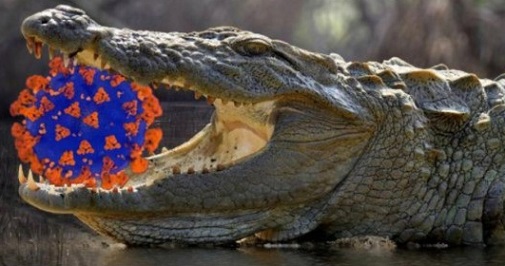SARS-CoV-2 News: Russian Scientists Warns That SARS-CoV-2 Contaminated Waste Water Supplies Can Infect Various Reptiles Including Crocodiles!
Nikhil Prasad Fact checked by:Thailand Medical News Team Dec 02, 2023 1 year, 4 months, 2 weeks, 4 days, 14 hours, 14 minutes ago
SARS-CoV-2 News: The global impact of the SARS-CoV-2 virus, which sparked the COVID-19 pandemic, has been unprecedented. Beyond its well-documented effects on human health, recent research that is covered in this
SARS-CoV-2 News report, conducted by the Siberian Branch of the Russian Academy of Sciences, Novosibirsk State University, and the Central Research Institute of the Ministry of Defense of the Russian Federation has brought attention to a potential environmental concern: the contamination of wastewater supplies with SARS-CoV-2 and its implications for reptiles, including crocodiles.
 Understanding the Path of SARS-CoV-2
Understanding the Path of SARS-CoV-2
SARS-CoV-2, a member of the Betacoronavirus genus, made its first appearance in December 2019 in Wuhan, China, causing an unknown pneumonia later identified as COVID-19. While early studies pointed to the RaTG13 isolate from intermediate horseshoe bats as a potential precursor, ongoing genetic evolution analyses of related betacoronaviruses in bats and pangolins have led to multiple hypotheses about its origin.
Evolutionary Insights
The virus's ability to overcome interspecies barriers has been a hallmark of its evolution. Documented cases of infections in various mammalian species worldwide highlight its adaptability. According to the World Organization for Animal Health (WOAH), as of June 2023, 29 mammalian species across North and South America, Asia, Africa, and Europe have been affected by SARS-CoV-2, with instances of reverse zoonotic transmission reported, particularly in minks on farms and domestic hamsters.
Fecal Transmission and Environmental Impact
Early in the pandemic, the detection of SARS-CoV-2 RNA in feces and urine raised concerns about potential fecal-oral transmission and environmental contamination. While viral RNA has been frequently found in feces, the isolation of infectious virus from waste and river water samples has been infrequent. Challenges in isolating infectious virus from such samples may be attributed to the low concentration of SARS-CoV-2 and the potential loss of its infectious properties during testing.
Aquatic Ecosystems and SARS-CoV-2
The interaction of SARS-CoV-2 with animals in aquatic ecosystems remains poorly understood. Recent findings have identified viral RNA in the digestive systems of bivalve mollusks and various mammals with aquatic or semi-aquatic lifestyles. Poikilothermic vertebrates, such as fish and reptiles, are integral components of these ecosystems, raising concerns about their potential susceptibility to SARS-CoV-2.
Susceptibility of Poikilothermic Vertebrates
To address the gaps in our understanding, researchers aimed to explore the species tropism of SARS-CoV-2 and its ability to replicate in various cell cultures of poikilothermic vertebrates. The study focused on freshwater fish, including fathead minnow and silver carp, and reptiles, such as the eastern box turtle, Nile crocodile, and loggerhead sea turtle.
Temperature Dependency of SARS-CoV-2
Temperature was identified as a crucial factor influencing the replication efficiency of SARS-CoV-2 in susceptible cell cultures. The study investigated the impact of ambient temperature on virus replication in poikilothermic animals, considering the conditions typical for the active life of cell donor animals.
Reptilian Susceptibility
Results indicated that SARS-CoV-2 effectively replicates in the cells of certain reptile species without the need for adaptation. Notably, the continuous cell culture TH-1 derived from the eastern box turtle heart and primary fibroblasts CNI from Nile crocodile embryos demonstrated high susceptibility to the virus at an ambient temperature of 29 °C. These findings suggest that SARS-CoV-2 can replicate efficiently in reptile cells under certain temperature conditions.
Comparison with Fish Cell Cultures
In contrast, continuous cell cultures of fathead minnow (FHM) and diploid fibroblasts of silver carp (CGIB) showed no susceptibility to SARS-CoV-2 infection, regardless of virus dosage and incubation temperature. The lack of infection in these fish cell cultures indicates variations in susceptibility across different poikilothermic species.
Discussion on Temperature Variability
The study emphasized the temperature-dependent nature of SARS-CoV-2 replication in susceptible cell cultures. Ambient temperature was identified as a critical factor influencing the efficiency of virus replication in cells of poikilothermic animals. The results highlighted the need for considering temperature variations when studying the dynamics of SARS-CoV-2 infection in diverse host species.
Comparison with Vero E6 Cell Culture
Comparison with previous studies involving the widely used Vero E6 cell culture model showed variations in susceptibility at different temperatures. While Vero E6 cells exhibited high susceptibility at 37 °C, moderate susceptibility at 29 °C, and low susceptibility at 25 °C, reptile cells maintained high susceptibility at 29 °C. These temperature-dependent variations underscore the importance of tailoring approaches when studying SARS-CoV-2 in diverse host species.
Conclusion and Future Directions
The global spread of SARS-CoV-2 may no longer be deemed a public health emergency, but the virus's circulation among animals poses ongoing challenges. The study's findings suggest a potential threat of SARS-CoV-2 contaminating aquatic ecosystems and its effective replication in certain reptile species. As the virus continues to evolve, the risk of new variants with unpredictable infectious properties remains a concern.
This research underscores the importance of monitoring and understanding the virus's interactions with diverse host species to mitigate potential threats to both animal and human health. Future research is warranted to explore the broader implications of SARS-CoV-2 in environmental reservoirs and its impact on wildlife conservation efforts. Understanding the intricacies of SARS-CoV-2's behavior in different environments is crucial for developing comprehensive strategies to protect both ecosystems and public health.
The study findings were published in the peer reviewed journal: Viruses.
https://www.mdpi.com/1999-4915/15/12/2350
For the latest
SARS-CoV-2 News, keep on logging to Thailand Medical News.
